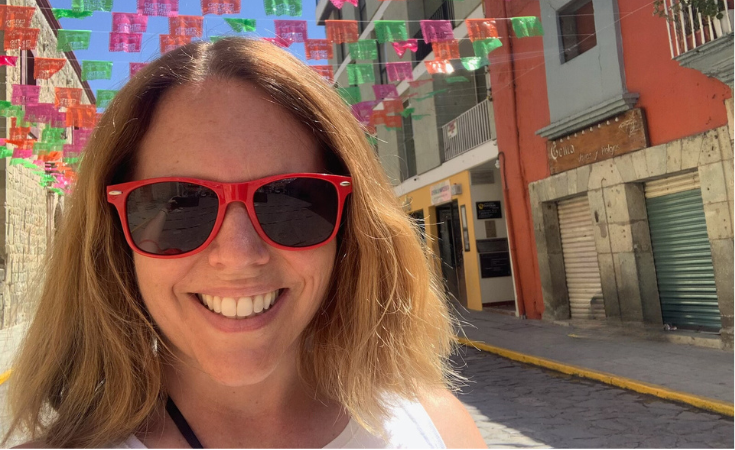Recently Prof. Kathleen McIntyre was awarded a Demers Foreign Language Scholarship and we asked her what inspired her to apply and how she plans to use this award. This is what she had to share:
What is your association with Honors and how long have you been connected to the program? How did you first get involved? Are there Any rewarding experiences you want to share about your involvement in the Honors Program?
I became an Associate Director of Honors focusing on student research and creative endeavors in fall of 2018. I also am an Associate Professor of Gender and Women’s Studies at URI. I hold a PhD in Latin American history and having the opportunity to coordinate the Honors Program’s final projects was very appealing to me. I love the process of undergraduates starting with a rough idea for a project and then seeing it come into fruition at our annual conference. Many URI Honors students later pursue graduate degrees, medical school, prestigious fellowships or the job market with primary source research and writing skills that they have honed through our program.
Probably my most rewarding experience was teaching a class related to my current research interest: women’s suffrage in Latin America. In fall of 2020 and 2021 I taught HPR 392: Give me Suffrage: Voting Rights in the Americas. The course involved a local public history component in which students researched the history of African American suffragists in early 20th century Rhode Island. Students worked on biographical sketches of women who signed a suffrage petition in 1916 at the Congdon Street Baptist Church in Providence. Their articles are published and available through https://documents.alexanderstreet.com/VOTESforWOMEN. For another assignment, students analyzed historical objects related to suffrage memorabilia in New England. I designed this course to coincide with the Long Rhode to the Vote: suffrage Centennial Lecture Series I helped organize with URI’s Center for the Humanities in 2020-2021.
You recently received a Demers scholarship. How did you hear about this opportunity? What made you decide to apply? How will you be putting those funds to use?
Kathleen Maher, Director of National Fellowships at URI, encouraged me to apply. Maher has had a lot of success in supporting URI undergraduates to pursue foreign language acquisition through the Demers. I originally thought the program was only for student applicants, but Kathleen shared with me the criteria and offered feedback on my application. My book, Protestantism and State Formation in Postrevolutionary Oaxaca (University of New Mexico Press, 2019), is currently under translation preparation by a Mexican university. I frequently give Spanish language academic talks at Mexican universities and research institutes including Universidad de Guadalajara, Universidad Nacional Autónoma de México, and Universidad Iberoamericana. I hope to improve my professional language skills so that I can continue to engage in more publishing and conference collaborations with Latin American scholars and institutions. I selected to take intensive lessons at Instituto Cultural de Oaxaca (ICO) as it is an excellent language center with decades of experience. I like how ICO tailors language study to each participant’s goals. My language study will focus on improving my Spanish writing and speaking skills to reach scholarly academic level of proficiency at the caliber of peer-reviewed Latin American academic journals. I also chose to study in Oaxaca City since it’s my main region of historical research (I’ve been doing archival research and field work in Oaxaca for well over a decade) and I am also hoping to co-lead URI’s Gender and Women’s Studies/Honors J-Term program in Oaxaca in the future.
What’s your advice to students or faculty who might be thinking about applying for this award in the future?
Think about how language study abroad will strengthen and enrich your academic and career goals. Attend Demers application workshops organized by Kathleen Maher and talk to students, staff, and faculty at URI who are past recipients. Research language institutions and programs to find the one tailored to your individual needs.

